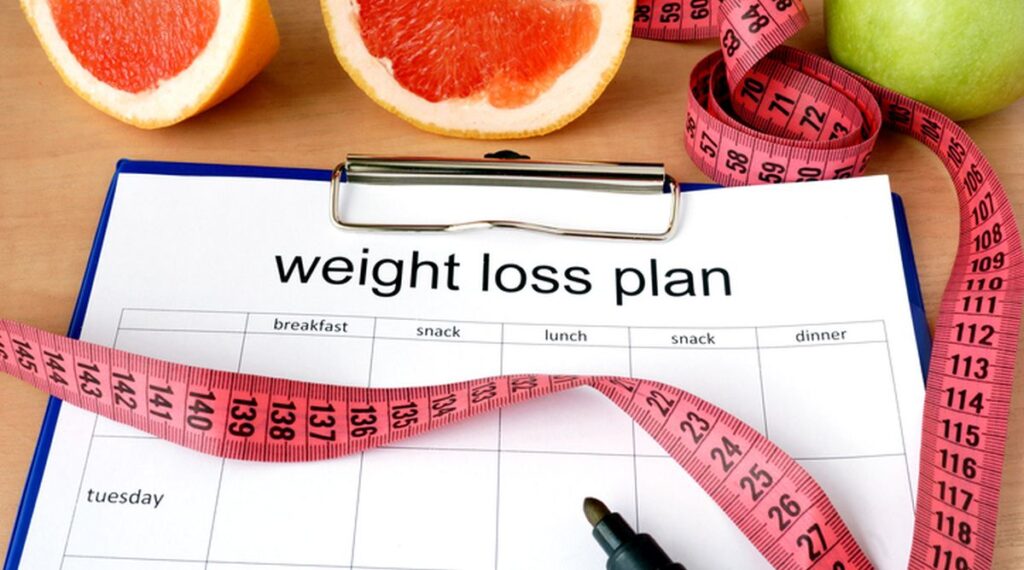Introduction
Losing weight can often feel like a daunting task, especially with the plethora of advice available online. However, sticking to evidence-based methods can make the journey more manageable and successful. Let’s dive into ten scientifically-backed tips for effective weight loss.

1. Set Realistic Goals
Why Goal Setting Matters
Setting goals gives you a clear target to aim for and can keep you motivated. It’s essential to set realistic goals that are achievable rather than aiming for drastic changes overnight.
How to Set Achievable Goals
Start by setting SMART goals: Specific, Measurable, Achievable, Relevant, and Time-bound. For example, aim to lose 1-2 pounds per week, which is considered a healthy and sustainable rate.
2. Stay Hydrated
The Role of Water in Weight Loss
Drinking water can boost your metabolism, cleanse your body of waste, and act as an appetite suppressant. Research has shown that drinking water before meals can lead to consuming fewer calories.
Tips for Increasing Water Intake
Carry a water bottle with you, set reminders to drink water, and try infusing your water with fruits for added flavor. Aim for at least 8-10 glasses a day.
3. Eat a Balanced Diet
Understanding Macronutrients
Your diet should include a healthy balance of carbohydrates, proteins, and fats. Each macronutrient plays a crucial role in your body’s functioning and weight loss process.
The Importance of Whole Foods
Focus on whole foods like vegetables, fruits, lean proteins, and whole grains. These foods are more nutritious and keep you fuller for longer compared to processed foods.
Read more: Kelly Clarkson’s Weight Loss 2023: A Holistic Approach to Wellness
4. Exercise Regularly
Types of Exercise for Weight Loss
Combining cardiovascular exercises (like running and cycling) with strength training (like weight lifting and resistance exercises) is effective for burning calories and building muscle.
Creating a Workout Routine
Start with a realistic plan that includes at least 150 minutes of moderate aerobic activity or 75 minutes of vigorous activity each week, along with muscle-strengthening exercises on 2 or more days a week.
5. Get Enough Sleep
The Sleep-Weight Connection
Lack of sleep can lead to weight gain by affecting your hunger hormones and increasing cravings for unhealthy foods. Aim for 7-9 hours of quality sleep per night.
Tips for Better Sleep Hygiene
Maintain a regular sleep schedule, create a restful environment, limit screen time before bed, and avoid caffeine and heavy meals in the evening.

6. Manage Stress
Stress and Weight Gain
Chronic stress can lead to weight gain by increasing levels of cortisol, a hormone that promotes fat storage, especially around the abdominal area.
Effective Stress Management Techniques
Practice relaxation techniques such as meditation, yoga, deep breathing exercises, or engage in hobbies you enjoy to help reduce stress levels.
7. Practice Mindful Eating
What is Mindful Eating?
Mindful eating involves paying full attention to the experience of eating and drinking, both inside and outside the body. It helps you recognize physical hunger and fullness cues.
How to Incorporate Mindfulness into Meals
Eat slowly, savor each bite, avoid distractions like TV or phones during meals, and listen to your body’s signals of hunger and fullness.
8. Limit Sugary and Processed Foods
The Impact of Sugar on Weight
High sugar intake is linked to weight gain and various health issues. Sugary foods and drinks are often high in empty calories and can lead to overeating.
Alternatives to Sugary Snacks
Opt for natural sweeteners like honey or fruits, choose whole-grain snacks, and keep healthy snacks like nuts, seeds, and yogurt readily available.
9. Track Your Progress
Benefits of Tracking
Monitoring your food intake, physical activity, and weight can provide insights into your habits and help you stay accountable.
Tools and Apps for Tracking
Use apps like MyFitnessPal or Lose It! to log your meals and workouts, or keep a journal to record your progress.
10. Seek Support
The Power of Community
Having a support system can provide motivation, encouragement, and accountability. Share your goals with friends, family, or join a weight loss group.
Finding Support Groups and Resources
Look for local or online support groups, and consider consulting a nutritionist or personal trainer for personalized advice.
Read more: Oprah Winfrey’s Inspiring Weight Loss Transformation: A Journey to a Healthier Lifestyle
Conclusion
Losing weight is a journey that requires patience, consistency, and the right strategies. By incorporating these scientifically-backed tips into your routine, you can achieve your weight loss goals and maintain a healthy lifestyle. Remember, it’s not just about the number on the scale but also about overall well-being.
Read more: Top 10 Weight Loss Products – Best Natural Weight Loss Supplements
FAQs
Q1: How much water should I drink to lose weight? Aim for at least 8-10 glasses of water a day. Drinking water before meals can also help you consume fewer calories.
Q2: What type of exercise is best for weight loss? A combination of cardiovascular exercises and strength training is most effective for weight loss.
Q3: How does sleep affect weight loss? Lack of sleep can disrupt hunger hormones and increase cravings, leading to weight gain. Aim for 7-9 hours of sleep per night.
Q4: Can stress really cause weight gain? Yes, chronic stress can increase cortisol levels, which promotes fat storage, especially around the abdominal area.
Q5: What are some healthy alternatives to sugary snacks? Choose natural sweeteners like honey, eat fruits, and keep healthy snacks like nuts, seeds, and yogurt available.

